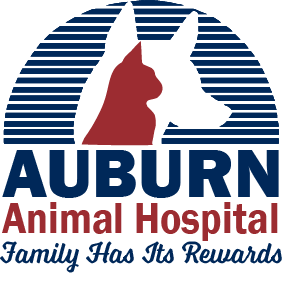Oral and dental disease is the most frequently diagnosed health problem for cats. The dental health of cats and dogs can effect every aspect of their health. Here’s a review of a few dental health facts for cats.
Dental Health Facts for Cats
Kittens have 26 temporary teeth that begin to erupt at about two to three weeks of age. Adult cats have 30 permanent teeth that start to erupt at about 3-4 months of age.
A cat’s incisors (the small teeth at the front of the mouth) are used for picking up food and grooming. Cat canines (the large pointed teeth) are used for grabbing prey. The molars (teeth at the back of the mouth) are used for crushing and tearing food. Unlike human molars which have a flatter surface, cat molars are pointed- signifying they are truly obligate carnivores. Cat tongues are covered in small “hairs” called papillae that are used for grooming.
Cats infected with FeLV or FIV commonly have dental disease. We recommend knowing your cat’s status. We can test for this at your next visit.
Dental Health Facts for Dogs
Puppies have 28 temporary teeth, 14 in the upper jaw and 14 in the lower jaw. These deciduous teeth erupt at about three to four weeks of age. Dogs have 42 permanent teeth, 20 on the top, and 22 on the bottom. These begin to emerge at about four months of age.
Studies show that by age three, 80 percent of dogs exhibit signs of gum disease. Puppies should lose a puppy tooth before the corresponding adult tooth emerges. If a puppy tooth is still in place when an adult tooth begins to show it is called a retained deciduous teeth. If this occurs, make an appointment at Auburn right away so the dog’s occlusion is not affected.
Signs of poor oral and dental health:
- Bad Breath.
- Change in eating or chewing habits or changes in appetite
- Pawing at face or mouth or drooling
- Sensitivity to having the mouth area touched
Pets sometimes show no outward signs of advanced dental disease but on physical exam shows gingivitis, periodontal disease, missing teeth, broken teeth or lesions may be noted by our veterinarians. That’s why it’s important to have a relationship with a veterinary hospital that really cares the way we do at Auburn.
